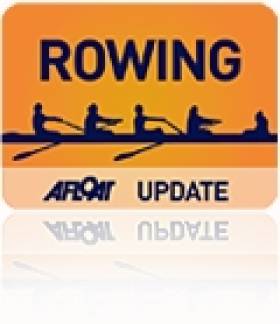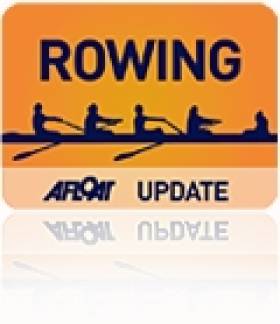Displaying items by tag: O'Neill
Neale In Control at Dublin Sculling Ladder Time Trial
# Rowing: Dave Neale of Old Collegians was the fastest sculler at the Dublin Sculling Ladder time trial on the Liffey on Saturday. The Offaly man had just under six seconds to spare over clubmate Sean Jacob, another former winner. Niall Beggan of Commercial was the fastest junior, and placed 12th overall. Hazel O’Neill of Trinity won the yew goblet for being the top woman, and again a junior placed very well: Neptune’s Claire Feerick was just eight places and less than seven seconds behind O’Neill.
Dublin Sculling Ladder Time Trial, Islandbridge (Selected Results)
Men: 1 D Neale 6 min 15.10 seconds, 2 S Jacob 6:21.09, 3 D Kelly 6:28.51, 4 G DeVita 6:29.33, 5 C Dowling 6:33.50, 6 M Bailey 6:33.93. Junior: N Beggan 6:40.79. NJ: R Quinn 6:57.35.
Women: 1 H O’Neill 7:10.78, 2 B Quinn 7:22.79, 3 J Ryan 7:24.46. Junior: C Feerick 7:17.65. NJ: K O’Connor 7:50.69.
Cork Sculling Ladder Presentation
The 2013-2014 Cork Sculling Ladder presentation (sponsored by Hanley Calibration Ltd) took place at Cork Constitution Football Club, Temple Hill, on Tuesday evening. Judge Donagh McDonagh, presented the trophies to the overall winner, Colm Hennessy (Shandon Boat Club) and the women’s overall winner, Marie O’Neill (Cork Boat Club). The 42nd Cork Sculling Ladder began on Sunday, October 6th, 2013 with the time trials at the Marina course, Cork and finished in mid April, 2014. John Mitchell (Lee Rowing Club) won the time trial and Marie O’Neill retained the overall women’s. Over 150 scullers participated in this year’s sculling ladder.
Judge McDonagh, who also presented the tankards to the section winners, is a former oarsman himself. He was part of the crew which won a maiden eight (now novice eight) championship of Ireland in 1973 with Dublin University Boat Club (Trinity). He was captain of Trinity in 1975 and is now club captain of Lady Elizabeth Boat Club.
Colm Hennessy had an excellent sculling ladder, winning the men’s open, intermediate, Junior 18 and Junior 16 sections. Marie O’Neill won the women’s open and Masters A sections.
The 43rd Cork Sculling Ladder time trial takes place at the Marina course, Cork on Sunday, October 5th, 2014.
Mitchell Fastest at Cork Sculling Ladder Time Trial
#CorkScullingLadder: John Mitchell of Lee Rowing Club was the fastest man at the Cork Sculling Ladder time trial at the Marina today. Dan Buckley of Lee and Eamon Joyce of Cork Boat Club were locked on the same time in a tie for second, just two seconds behind Mitchell. One place further back, three men tied for fourth: Dan Begley of Shandon, David Synnott of Lee and Colm Hennessey of Shandon. Marie O’Neill of Cork BC, who won last year, was also the fastest woman this time.
Cork Sculling Ladder TT, Marina, Cork (Selected Results) Men: 1 J Mitchell (Lee RC) 7:08, 2= D Buckley (Lee), E Joyce (Cork BC) 7:10; 4= D Begley (Shandon), D Synnott (Lee), C Hennessey (Shandon) 7:20. Women: M O’Neill (Cork BC) 7:53.
53 Degrees North Store Opens at Western Marine
53 Degrees North, Ireland's Outdoor Adventure Stores with branches already at Carrickmines and Blanchardstown - caters to Climbing, Hillwalking, Biking, Camping, Hiking, and of course watersports including Kayaking, Sailing, Surfing and Swimming.
Western Marine, Ireland's Largest Marine Distributors, was established in 1966 and is based at Bulloch Harbour since 1968. Western Marine caters to all marine markets, from sailing and motorboating to commercial workboats, and specialises in inflatable boats and RIBs as well as a huge range of marine equipment, lifesaving equipment etc.
Commenting on the new store, Western Marine's MD, Hogan Magee said "We're very enthusiastic about this venture - 53 Degrees North carry a full range of clothing, footwear and equipment from value for money through to top end premium quality products and that fits very well with our own philosophy of providing of premium quality at affordable prices.
The two ranges are complimentary, with very little product overlap, and the result is a truly comprehensive watersports display that we think is unparalleled anywhere in Ireland".
53 Degrees North MD Alan McFarlane said "We're really excited about this. Western Marine has a superb reputation in all marine markets, and the combination of the Western Marine and 53 Degrees North brands will give us both a wonderful opportunity to grow our businesses.The huge range of watersports gear which we offer now has a waterside home, and a whole new customer base. With free car parking spaces available in the adjacent boatyard, shopping with 53 Degrees North at Western Marine could not be easier"
Among the huge range of brands now available under one roof are worldwide leaders including Zodiac inflatable boats and RIBs, Teleflex steerings and engine controls, Skipper and Besto lifejackets & buoyancy aids, Icom VHFs, Gleistein yacht ropes, McMurdo EPIRBs, Harken, Lewmar, Garmin GPS, Pains Wessex Flares, Musto, Helly-Hansen and Henri-Lloyd sailing clothing, Dubarry marine footwear, O'Neill wetsuits, Oakley eyewear, surfboards by Cortez, and kayaks by Islander and Wilderness.
The new store is open 7 days a week throughout the Summer, with opening hours 9am to 6pm Monday through Saturday, and 1pm to 6pm on Sunday


























































